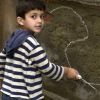 Tbilisi’s public school No. 43 is one of 100 schools implementing a pilot version of the National Curriculum Program, a key element of the Ministry of Education and Science’s reform plan, for the past five years. Nick is a nine-year old student in the school whose entire education has been under the pilot program.
Tbilisi’s public school No. 43 is one of 100 schools implementing a pilot version of the National Curriculum Program, a key element of the Ministry of Education and Science’s reform plan, for the past five years. Nick is a nine-year old student in the school whose entire education has been under the pilot program.
Like most children in his school, Nick says that “nature”, one of the new classes introduced under the pilot program, is his favorite subject. “I like nature classes very much. We usually draw some pictures, create sculptures, read books and see very attractive pictures there. We can find out how our earth looks like, what is the moon, or sun… or what animals live in the zoo. There are a lot of pictures in my books and I like it very much,” said Nick.
Under the program, all its elementary classes learn new subjects using new textbooks, prepared using a new methodology. In addition to introducing nature classes, dancing and singing into the curriculum, children study Georgian language and mathematics beginning in the first grade, as well as physical education. From the second grade, they begin learning a foreign language, whereas previously they began with foreign languages only in the fourth grade.
Nino Kostava is Nick’s teacher. A teacher for the past fifteen years, she teaches Georgian language, mathematics and nature. She explained some of the aspects of the new teaching methodology: “The new methodology of teaching includes a four-month semester system. Furthermore, there are new textbooks with many big pictures and small texts.”
The main difference between the old and the new teaching systems is the way lessons are organized. “These new books ask pupils to give their opinion about a text. From my point of view, it is not a very effective method, because children have no time for both – understanding the content of a story and also expressing their opinion about it. So, I also use the old method: I have the children read a text, then write down the content of a story and finally, I ask for their opinion,” Kostava explained.
The Ministry of Education and Science says that the pilot program has been very successful, and one of the reasons is that children like the new colorful, interactive textbooks – in spite of the fact that teachers complained to President Mikhail Saakashvili in 2008 about a shortage of books, and Saakashvili, himself said he was not pleased with the new materials for young pupils.
This highlights the fact that, though it is now in its fifth year, there are no official studies on whether or not the pilot program has been successful, and the government has not published any statistics on the program.
At the end of 2006, the Georgian Opinion, Research, and Business International organization (GORBI) conducted research in collaboration with the ministry, when the first year of the pilot program was completed. It recommended that, in order to reach a higher quality of education, the most important aspect of the reform program was to raise wages for teachers and school administrators. It also surveyed people about the quality of education in Georgian schools. Most respondents said they liked the quality of teaching in schools and thought that the new reform was effective.
However, the Ministry has not yet made available any information about the conclusions drawn at the close of the five-year pilot program. In spite of this, from 2007 on, it was extended to all 2444 schools in Georgia.
Tags: Curriculum, Reform
